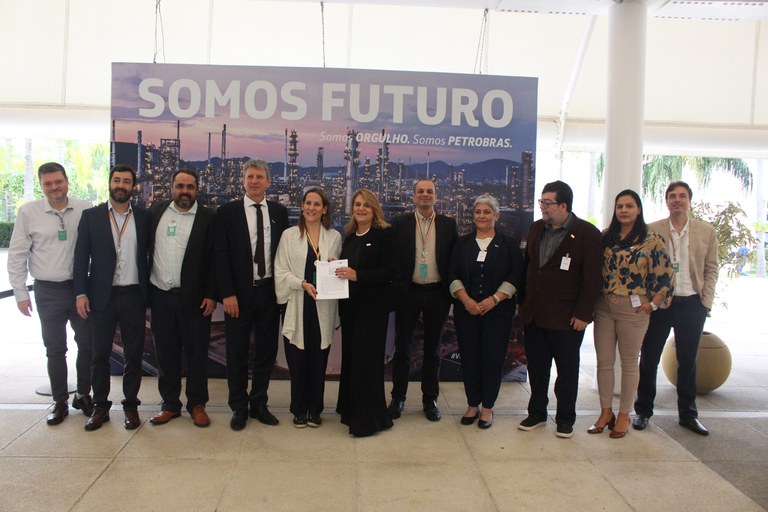Notícias
BIOECONOMY
Brazil’s Petrobras, Embrapa sign low-carbon research partnership

Petrobras and Embrapa representatives: companies seek to develop sustainable products (Image: Petrobras Agency)
Petrobras and the Brazilian Agricultural Research Corporation [Empresa Brasileira de Pesquisa Agropecuária/Embrapa] have joined forces to research and develop low-carbon products, such as biofuels, green chemicals and fertilizers. The partnership aims to develop technological solutions for Petrobras’ industrial production of biofuels and bioproducts. In return, Embrapa will develop protocols for low-carbon crops using rational agricultural techniques like the soybean certification protocol.
The cooperation agreement, signed by the companies on Friday, September 6, also includes the development of alternative crops to soybeans, such as macaúba, intercropping and cover crops, safrinha corn, carinata (a type of oilseed), among other options that reflect the range of possibilities for agro-energy across the country's different biomes and production systems.
Petrobras CEO Magda Chambriard believes that “diversification and access to inputs with adequate sustainability, quality and cost are crucial to the success of initiatives such as biofuels.” The company wants to produce fertilizers to bolster domestic supply and to meet the goals of Brazil’s National Fertilizer Plan [Plano Nacional de Fertilizantes].
“For Embrapa, resuming the partnership with Petrobras is strategic to enhance its contributions to rural producers and to public policies, both national and international, especially in bioeconomy and sustainable development,” said the company's president, Silvia Massruhá.
FERTILIZERS — In the field of fertilizers, the cooperation aims develop new products and foster their entry into the agribusiness market, such as new urea-based fertilizers with higher added value, mixed fertilizers, fertilizers with differentiated granulation and new sustainable inputs with a lower environmental impact.
The goal is to ensure that farmers can access and utilize these innovations, providing fertilizers tailored to the specific crops and soils of Brazil, ultimately leading to higher-yield harvests.
According to Massruhá, the partnership involves topics such as biomethane and biogas in the context of the Sectoral Plan for Adaptation to Climate Change and Low Carbon Emissions in Agriculture [Plano Setorial para Adaptação à Mudança do Clima e Baixa Emissão de Carbono na Agropecuária], as well as the creation of research and development networks around more sustainable raw materials.
“We believe that technical and scientific data will be extremely important to the development of new products for the fertilizer market. Petrobras is committed to developing new solutions to serve this sector, which is so strategic to Brazil,” said Chambriard.
FACTORY — Investment in fertilizers has once again become part of Petrobras' portfolio, in accordance with its 2024-2028 Strategic Plan. In August, the company announced the resumption of activities at the Araucária Nitrogenados S.A. (Ansa) fertilizer factory in Araucária (state of Paraná). As a result, operations for the production of urea, Arla 32 (Automotive Liquid Reducing Agent) and ammonia in Brazil will begin in the first half of 2025.